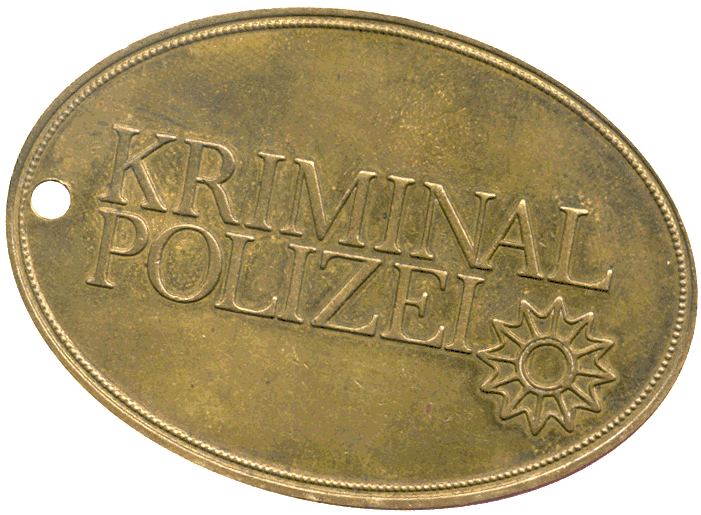From Kripo to SiPo, the Nazification of German Detectives

The Kriminalpolitzei, known as Kripo, was the German equivalent of the British CID. It began in Prussia in the 1790s with six plainclothes detectives tasked to investigate serious crimes. Over the 19th century, the Kripo expanded until all major cities in Germany had a branch. While the Kripo had units tasked to investigate political crimes, Kripo detectives in general prided themselves on being essentially apolitical, regardless of their outside political backgrounds and interests.
For the Nazis, the Kripo presented a problem. Some more radical Nazis wanted a purge of German police forces, which would then be staffed with SA thugs. Nazis with police backgrounds, specifically Arthur Nebe and Wilhelm Frick, blocked such maneuvers and Hitler’s decapitation of the SA in the summer of 1934 put the permanent kibosh on a police-wide purge. Frick and Nebe valued professional detectives, but wanted them to be, over time, thoroughly Nazified. Their method of doing this was more subtle than it was in other bureaucracies.
The Nazis began by breaking the Weimar-era police unions, replacing them with the Nazi approved police union. Frick used his control of the union to turn it into a device for delivering a constant stream of Nazi propaganda, under the guise of educating the police forces on Nazi theories of the law and its enforcement. Weekly training and indoctrination sessions became the norm, but the explicit Nazi content was kept at a minimum to avoid alarming mature career detectives.
The one area where the Nazis conducted an ideological purge was in the police training division. Many Weimar era instructors were dismissed from their jobs and replaced with dedicated Nazis. Over time, older detectives started to notice just how committed recruits were to Nazism, but the change was gradual, and it was apparently easy to work day to day without noticing it.
Besides, it wasn’t as if the regime failed to offer treats to the Kripo.
The rise of the Gestapo, at first, seemed to Kripo detectives a blessing, because it meant that Kripo no longer needed to maintain the political police divisions that threatened their identity as apolitical professionals. Kripo detectives were generally disdainful of the Gestapo for a number of reasons: Gestapo operatives were mostly former lawyers and administrators instead of trained police officers, they employed torture, and their remit was explicitly political. Still, Kripo detectives were relieved, at first, that they at least could tell themselves they weren’t accomplices of those who did the regime’s dirty work.
Also, Kripo members were initially pleased at the expanded powers the Nazi state gave them, and of the reduced rights for those accused of crimes. Many detectives who’d chafed under the restrictions of the Weimar constitution now found themselves able to operate much more aggressively than before. Now, Kripo detectives were empowered to arrest those they believed likely to commit a crime in the future–with legal standards around the word “likely” so loose as to constitute a joke.
But, though the Roehm-Putsch had rescued the Kripo from the domination of the SA, another organization, Himmler’s SS, now cast covetous eyes on it. The destruction of Ernst Roehm, Himmler’s former boss, had greatly enhanced his prestige, as well as that of his deputy, Reinhard Heydrich. They already controlled the Gestapo, and now they wanted to arrange it so that heretofore apolitical Kripo would have to merge with it.
Once again, Frick attempted to block this attempt to crudely Nazify the Kripo, but Hitler had been growing increasingly frustrated with his interior minister. Frick was seen as too reluctant to place opponents under “protective custody” (newly authorized and defined under the Gestapo Law of 1936), and Heydrich used his intelligence files to undermine Frick’s deputies with the goal of making the Interior Ministry appear politically unreliable. By the summer of 1936, Frick could no longer resist Himmler. Adolf Hitler transferred control of all Reich police forces to Himmler’s control in June of that year. (Technically, the interior ministry still oversaw the police, but because Himmler was Reichsfuehrer-SS, only Hitler could give Himmler orders.) The Kripo merged with the Gestapo and SD to become the Sicherheitspolitzei, or SiPo. Kripo detectives, who had long believed themselves politically independent, now understood the era of independence was over.
For more on this, read Hitler’s Enforcers: The Gestapo and the SS Security Service in the Nazi Revolution by George C. Browder.